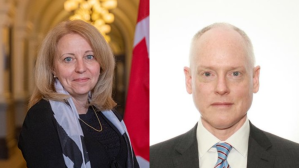‘Democracy, good governance and economic reforms are not incompatible’
A failed state, a basket case — that is the conventional wisdom in India when it comes to Pakistan’s economy. But my guest is some...

A failed state, a basket case — that is the conventional wisdom in India when it comes to Pakistan’s economy. But my guest is somebody who’s turning it on its head, and he has the finest credentials to do that. As the World Bank’s chief economist for China, he’s seen a socialist economy turn around. You’ve helped turn around economies in Latin America, Africa, Central Asia. Dr Ishrat Hussein, Governor of State Bank of Pakistan.
I’m happy to be here and try to exchange views on what is happening in Pakistan, because I find that there is very little understanding about Pakistan’s economic journey which began in December ’99.
With which phase in our Indian economic reform would you compare this to — with the arrival of Dr Manmohan Singh in ’91 or the BJP’s last phase?
I think India did the right thing. They started the reforms back in ’91 and then every succeeding government pursued the same path. There were some nuances, there was some fine-tuning but the direction was very clear. Whether it was Mr Gujral, or Mr Gowda, or the BJP, they carried the reforms forward. And I think that is paying dividends today. And that’s why I think that what we started in ’99 will take some time before it becomes quite…
In fact, I did read two points in one of your papers. One, that many of these ideas of economic reform have now acquired wide consensus in our political system.
Right.
And second, I think you made a point that some of us try to make here — that the last verdict in India’s parliamentary elections should not be seen as a vote against economic reforms.
Right. As a student of Indian economics, I personally think that what the poor are saying by their votes is that the reforms have not been deep-rooted, they have not been wide in their coverage and there is a lot which needs to be done in order to share the benefits of these reforms with a wide majority which is dis-enfranchised. I think that is the way I interpret the vote.
Does some of that come out in Pakistan as well?
Yes. I think the burden of incumbency in South Asia has become very heavy because the expectations which have been ignited by the communications, and particularly the electronic media, are extremely heightened while the delivery capacity of the States, in India, Pakistan, Sri Lanka, Bangladesh is very poor. So this gap between the delivery capacity of the State and the heightened expectations has imposed a very heavy burden on the incumbent governments.
So people are getting impatient. And all they can do is change the government.
That’s the only thing they have, the right to vote and throw out the government. And this is what they are doing.
But our politics is not perfect either. I wish you were here in our last Budget session to see a whole Budget passed without debate.
But you know political systems have to evolve with the passage of time. And I think economics and politics are now becoming quite intertwined. If this government or any government in Pakistan is not able to deliver on the economic promises they make, then they will be thrown out of power. And therefore, this has become a compelling reason for the predominance of economics as far as the political life is concerned.
Would you say that reform and democratisation have also become inseparable in a way?
I think reforms by now have proven to be a staple for sustained economic development and poverty. The record of India in the 1990s, where faster economic growth led to poverty reduction, shows that politicians who follow that path will have a lot to…
But is reform also an engine of democratisation.
I couldn’t say that because reform means that there are winners and there are losers. And who are the winners? If the winners are those who are in vocal majority, the reforms will take their own…
Because you talk about empowering local communities. You talk of getting the government out of our lives. That cannot happen till you build democratic institutions.
My emphasis is on good governance. Because the capacity to deliver to the poor depends on the institutions entrusted with that particular job. Democratic oversight and accountability are essential ingredients. If a local government is unable to deliver those goods and services which they had promised, they can be thrown out. Therefore, the transition, from the perspective of the dis-enfranchised and the poor in a democracy, leads to a sustenance of economic reforms.
How did you turn things around in Pakistan? You know, plus 5% growth, stable exchange rates, good forex reserves, booming stock market, stable prices. Tell me the three pills that worked.
I think there were expectations from the new government that it would pay a lot of attention to the structural reforms in the economy, not only stabilising the economy itself, but carrying out structural reforms which will be able to produce results over time.
But what were the specific things you did? Three things that worked.
External debt reduction. That was No. 1. We went in for restructuring and reprofiling our external debt so that the burden of the debt does not crowd out the expenditures on development and poverty.
To that extent, 9/11 became a blessing instead of a liability.
No, even before that. We had agreed with the International Monetary Fund on a particular programme. The stand-by programme was completed well before September 11 and we were pursuing the three-year PRGF. Part of that was a reprofiling of Pakistan’s external debt on a long-term basis. And that had been agreed before September 11. The second aspect was reduction in our fiscal deficit, because our external borrowing and domestic borrowing was a reflection of the poor economic management on the fiscal policies. So we took tough measures in order to reduce the fiscal deficit from 7 % of GDP to 4 %.
If you’d done that in India, you would have had problems. People would have said you are a Fund-Bank man who’s enforcing the American agenda.
That is true, that was the case in Pakistan too. I was personally attacked by people who were saying we are pursuing the IMF-World Bank agenda. But this year, we are saying goodbye to the IMF and the results are quite obvious. You have to be patient, you have to explain to the people, you have to communicate to the people why you are doing things which make sense from the country’s perspective rather than from the IMF’s. We were using the IMF and the World Bank in order to carry out our own agenda.
One of the many things you say will be blasphemous in India right now. For example, you make a fascinating point that government should be in those areas of economy where social profit is paramount.
Right.
But in all other areas of the economy where private profit is paramount, only the private sector should be. And there you list things like oil, gas, energy, highways and things like that. In India, the nuance is that the government must remain in these areas to give competition to private sector so that monopolies don’t come about.
Right. I agree that monopolies are the worst thing. The private monopolies are worse than the public monopolies. But you have a system of enforcing regulation where the voice of the consumer, the voice of other stakeholders is taken into account. And the trick for that is you must have a quasi-judicial independent regulatory agency.
Are those working in Pakistan?
They have begun to. It’s a new phenomenon. We now have regulatory agencies for power, electricity, gas, oil, telecommunications, electronic media.
I notice that 80% of your banks have now become private.
That is true, because we wanted to sever the connections between the government and the banking systems.
That’s the fascinating point you make, that now the linkage between government and business should be broken through privatisation.
Exactly.
And that you are doing it.
And the reason is that there was too much political interference in appointments.
Into banks?
For key jobs at the banks. And that resulted in very high non-performing assets — 25% of our gross stock of the loans was non-performing. Since we have privatised, the efficiency has improved, competition has ushered in… interest rates have come down…
I believe they are lower than in India now.
That’s right.
So, I could ask a Pakistani bank to refinance my housing loan.
I hope in future you can do that… Our average interest rate today is 5% and some good corporate houses are offering 3%…
Since you began to deregulate, privatise, you took so many services in the private sector. You’ve been saying you must reduce the cost of energy for the middle-class. And the prescription is not cross-subsidies, but aggressive privatisation.
Exactly.
So have prices for goods and services gone up since you privatised?
No, I mean there is an inflation rate which has remained below 4 % during the last three years. This year, inflation is picking up, as it’s around the world. But we have some peculiar phenomenon in Pakistan also, because we privatised the procurement of the wheat…
And rice?
Rice was already in the private sector. But because this (wheat) was done for the first time, and the government was not able to build up its own reserves and stocks, the prices have started shooting up. So this year, the government has decided to import some wheat in order to build up its strategic reserves. And release the wheat at the time when the prices are shooting up… The point is, you can manage the private procurement of the wheat, provided the government has strategic reserves in order to release it at that time…
So let me come back to banks. You privatised 80 % of your banking.
Yes.
In that process, because the argument here is… It’s an emotional issue here — if you do this, one, the poor shall suffer, two, your borrowing rates will go up, three, too much arbitrariness will come in, four, the farmers won’t get any credit. Or what is called priority-sector lending. You use the term in Pakistan?
Yeah, we did. But let me…
You don’t do it anymore?
Not anymore. But let me tell you what is happening. If you don’t have a strong banking regulator, I agree with the people who argue against privatisation. If you want a private sector-based banking sector, you must have a very strong regulator who does not allow the owners and the managers to take excessive risks. In Pakistan, as the Central Bank has acquired independence and autonomy and is exercising its muscle, the private banks are under control. This has resulted in lower borrowing costs, but more importantly…
Lower NPAs or not?
Lower NPAs. But more important, agriculture, which was a priority sector, for which there were mandatory credit limits by the Central Bank was always below target in the past. But for the last three years…
And the banks got away by paying penalties?
By paying penalties to the Central Bank. During the last three years, we had a task-force consisting of the bankers as well as the farmers, and they came up with a scheme which resulted in a win-win situation, where the banks are making profits and the farmers are getting access to the…
Are more farmers getting credit?
From 400,000, today we have 1 million farmers who are benefiting.
In how much time?
In about three years’ time.
And what is the amount of credit that has gone to the farmers? One of the promises of this government is to double farm credit in three years.
We have tripled this during the last four years. From Rs 32-35 billion, it has gone to Rs 85 billion. And our target is Rs 100 billion by next year, and then double in three years. But more important are the new borrowers, because we want to broaden the base. So at this moment, only 15 % of the farmers are being covered by agriculture credit. We hope in four years, 50 % of the…
So, since you privatised, not only are more farmers getting credit, they’re getting more credit at a cheaper price.
At cheaper prices, absolutely.
You know, could you have done this in what our Finance Minister calls ‘‘the noise of democracy’’?
I think India itself has carried out a lot of reforms since ’91, which was in a period of democracy. So I think the pace may be slow, it may not be linear, you may have reversals and setbacks, but as I said if the direction is clear, the pace doesn’t matter.
That’s a question often raised in India: that good economics is bad politics, that reformers lose.
I have presented a paper during Benazir Bhutto’s time in ’96 where I argued that good economics…
…that there was neither good economics nor good politics that time…
No, but I argued that good economics is good politics. Because if you believe in patronage only for a few people who are your party supporters, other people get disenchanted. But if you follow good economic policies which benefit everybody, across the board, the electorate will support you. And this paper has now been taken up by the new Parliamentarians and they are looking at this… that democracy, good governance and economic reforms are not incompatible, actually they are compatible.
See, there’s another point — maybe I’m dragging you into high politics — which is a view in India that Pakistan has paid a price for what we call as supporting terrorism in Kashmir, what many Pakistanis would describe as allowing the growth of fundamentalism, terrorist organisations. Partly it’s also happened because your population is growing much faster.
My analysis of the decade of the 1990s, when we were left behind India, is that we did not continue with the same intensity the thrust of the economic reforms.
But sir, when your State is so involved in other operations, when your institutions are getting weaker as a result, you cannot reform.
But the question is what was happening to defence expenditure? There was a lot of misgiving that Pakistan’s spending too much on it. As a matter of fact, from 7% of GDP, it is down to 3.5% …
It’s not a defence expenditure thing. It is a price that we believe Pakistan has paid in terms of its institutions weakening.
No, institutions have weakened because of their politicisation, not because of any other issue, in my view. Because the civil service, the judiciary, the police — basic institutions were politicised. … But I am talking precisely of the decade of the 1990s, when we were left behind. That, I think is not so much…
You now see Pakistan catching up.
Absolutely.
And can it catch up unless it addresses the population problem?
I think population growth has gone down to 1.9 %. We are five years behind India as far as the demographic transition’s concerned. But the demographic transition has started and I am optimistic that if we continue having 6-7 % annual GDP growth, we will be able to go back to the point where we were. It is not so much catching up with one country. It is the reduction in the poverty which is bothering us. We had brought down the poverty to 18% at the end of the ’80s. It has gone up to 33%. We want to reduce it again to 15-16% in five or ten years.
You’ve known many of the economic reformers in India. You’ve worked with them — Dr Manmohan Singh, Dr Y V Reddy, Montek Singh Ahluwalia, Shankaracharya — how do you compare what they’ve been doing here with what you’ve been doing there?
I think they’ve been doing excellent jobs. Montek Singh Ahluwalia is one of the brightest persons. He was one of the architects of the economic reforms, along with Dr Manmohan Singh and Shankaracharya and Bimal Jalan and Dr Reddy. So this Indian economic team — and Mr Chidambaram was the Commerce Minister at that time — is a first-rate one and that’s…
India and Pakistan always compete, so now some of us wish they would compete maybe in areas like economic reform, besides cricket…
I think the South Asian region has been left behind, because we have not done so much as far as the intra-regional trade and cooperation is concerned. And rather than competing, the idea is that we should try to exploit the opportunities of a 1.2 million population, a billion population, which is inhibiting this region. That is the opportunity we should try to exploit.
If you met your former colleagues from World Bank, IMF, people who are carrying Indian economic reforms forward, what advice would you give them?
I think they should let the countries decide what is good for their own interests. But at the same time, we should not resist looking at the experiences of other countries. And we should not resist getting advice from the international financial institutions, from academic institutions, from scholars around the world. We pick and choose what we can do for our own countries.
But one problem we have in India is that our reformers don’t sell reforms. They don’t say globalisation is a great opportunity, WTO is just what we needed. They say on the other hand, Ab globalisation to hona hi hai — you have invited the wolf to dinner, that you may have to dance with him, so learn to dance.
I think it is a fact that globalisation is something which we cannot actually avoid. All we can do is to prepare ourselves…It’s good for us, provided we exploit the beneficial opportunities which globalisation offers. But if we sort of get into our shell and say we don’t want to face globalisation, we don’t prepare ourselves for globalisation, then we are going to suffer.. Globalisation has provided both opportunities and threats. We can avoid the threats and hang on to the opportunities.
There is speculation that you may be the next Finance Minister.
Well, I don’t know about that.
Your PM — ex-Citibanker, you — ex-World Bank, here Dr Manmohan Singh and Chidambaram, again two key people whose basic instinct is reformist and economic — we may not find such an opportunity again between India and Pakistan. And in politics, things don’t remain the same forever.
I agree with you that as far as the economic teams of both the countries are concerned, they are almost on the same wavelength. So if we are given the opportunity to work together, we will do our best.
So maybe if we get them to solve problems, instead of our military and political teams, good economics will make for good politics.
But I think you cannot get away from the realities that those are the political masters and we, as technocrats and as reformers, have to follow them.
But as they say, economics is 80% politics.
Well, that’s true.
Photos



- 01
- 02
- 03
- 04
- 05




























